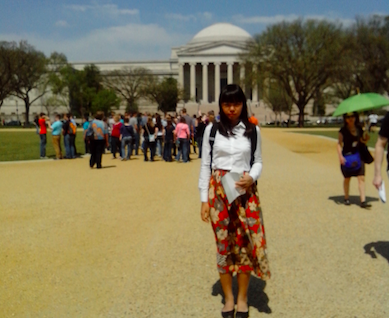I came to the US on an F-1 student visa in 2014, to attend college. I am allowed to remain in the country so long as I continue to study full time at an academic or language-training institution that is recognized by the Student and Exchange Visitors Program, which is itself maintained by Immigration and Customs Enforcement, otherwise known as ICE. I am required to report my location and my profession at all times to the Student and Exchange Visitor Information System (SEVIS); a program called Optional Practical Training (OPT) has given me 12 months to work in the States after graduation.
The visa process to come here for college took about two months. There were forms I had to painstakingly fill out online, noting my country of origin (Hong Kong SAR), whether I had ordered, incited, committed, assisted, or otherwise participated in genocide, terrorist activity, and/or torture (I had not), whether I had been in the US before (yes, for five days in 2013), what my occupation entailed (“studying”), and what I was going to the US for (to study anthropology at the University of Chicago). I pored over detailed guides provided by the university on how to fill out the forms correctly, how to decipher the language of American bureaucracy, to ensure my visa application would go through. I paid the fees, and scheduled a visa interview to complete the process.
The US Consulate in Hong Kong is on Garden Street (花園道), between Central and the Mid-Levels, in an area historically occupied by rich expatriates and businessmen. Across from it is the Helena May, an aristocratic women’s club housed in a white Edwardian mansion and founded by the wife of a British governor. You’d expect the US Consulate to be as grand and forbidding as the rest of its surroundings, but in actuality the compound looks like shit. Thinking about how totalitarian the space felt, I walked through the grey doors where I had to relinquish my mobile phone to the security guards; the only detail I remember about the giant room in which the visa interviews were being held is that all of the consular officers were seated in separate booths behind bulletproof glass. The officer assigned to look over my papers wondered at my scholarship (“Wow, they’re paying for everything?”), and said my English was “really good.” He asked me if I had gone to an international school. (I most definitely had not.) Why did I have such great English? Why did I want to go to the United States?
I remember looking at him, his pale face framed by short sandy hair, and thinking, How do I explain to him why my written Chinese is nowhere as fluent as my English? How do I explain myself? I wanted to tell him that whatever image he might have gotten of Hong Kong in his time here, as a site of East-meets-West hybridity, where locals navigated the landscape of British colonial buildings and Taoist temples deftly, who refreshed themselves with a nice cup of milk tea and a slice of Swiss roll after watching yet another horse race, was only accurate if you happened to be born into privilege. I didn’t want to get into the weeds of my family’s convoluted history, which would require me to talk about my autodidact of a mother and my long-absent father. I thought about saying something like, “I place full stock in the idea of a global citizenry, and believe that America is a post-racial Eden for a brown kid like me.”
The truth was I did want to live in a place where I wouldn’t be made fun of for not really passing as Chinese—I felt like I’d irrevocably exchanged one part of myself for another in a zero-sum game that I never wanted to play, before anyone had even explained the stakes to me. Leaving Hong Kong, I thought, felt natural, even genetic, as if there was a gene for transience, passed from my grandparents to my parents, and now onto me and my sister.
I thought about how adults, from random aunties we knew to my close family members, were always saying to my mother that my sister and I were well prepared for the realities of the global economy. I knew this meant that a) our English language skills were good enough for us to pass for “native,” that is, foreign-born speakers, an extremely marketable skill, and b) no compliment about our intellectual prowess was intended. The idea was that we’d be much better at fooling foreigners (white people in particular) about our abilities and/or access to the norms and unspoken rules of respectable, international bourgeois society. I knew that because my family was poor, these aunties and uncles were not only envious that my mother had had the foresight to train us, they were also resentful.
But I sensed that it wouldn’t be appropriate to talk about survival, that the consular officer wouldn’t take kindly to a heartwarming tale about my family gaming global capitalism. I also assumed that he wouldn’t enjoy a lecture on how Hong Kong’s history of colonisation and subsequent takeover by a hostile regime has been whitewashed, or even that globalisation distributes its burdens unevenly, to the detriment of working-class people in the non-English-speaking parts of the world. It would be best, I thought, to present myself as a young woman who considered the world her oyster. I stuttered something about being somewhat mixed, that I had a grandparent from Trinidad, that we spoke an amalgamation of English and Cantonese at home. I said I wanted to see what the West was like. My mother smiled encouragingly, and so did the consulate officer. I passed the interview.

At the time I didn’t think about coming to America as an act of immigration, or really, that I was making claims about my personhood, and acquiescing to regimes of control. I was impatient to be a new person, in a new country, to pursue a life of monastic academic austerity. In retrospect, I was not a very smart teenager.
The government calls me alien. According to 8 USC § 1101(a)(3), an alien refers to “any person not a citizen or national of the United States”; a national is only defined as someone who owes “permanent allegiance to a state” some 19 sub-sub-statutes later. In 1996, Bill Clinton signed the Illegal Immigration Reform and Immigrant Responsibility Act to curb visa overstays, and to penalize undocumented immigrants with re-entry bans and deportation for misdemeanors and felonies. One of the attackers in the 1993 World Trade Center bombing turned out to have been in the States on an invalid student visa, leading Congress to consider foreign students running amok to be a major national security threat. It’s this moment that arguably serves as the beginning of the current national security architecture when it comes to student and scholar status. The Act required then–Attorney General Janet Reno to figure out a way to collect information from foreign students and exchange visitors, and scrutinize their movements across the country, including a mandate that allows the attorney general to bypass FERPA, or the Family Educational Rights and Privacy Act of 1974, when dealing with their education records.
Then 9/11 happened. The Patriot Act of 2001 mandated the deployment of the electronic reporting system that we now know as SEVIS. This means that all foreign students’ courses of study, enrollment and employment records, addresses, and legal statuses now have to be reported to the US Department of Homeland Security. It is both sobering and amusing to think about the possibility of an official somewhere in the Pentagon becoming exasperated over my constantly changing majors for the first three years of my college career, or my obvious distaste for the general science and math classes I was required to take.
For the first three weeks as a UChicago student, I carried my papers with me everywhere in my satchel, from one class to another, afraid of any misstep that could result in my deportation. This included my passport and my I-20, or the Certificate of Eligibility for Nonimmigrant Student Status, which certifies that I “seek to enter or remain in the United States temporarily, and solely for the purpose of pursuing a full program of study at the school named” on the form. Later on, I added my Individual Taxpayer Identification Number to my file, and when I was cleared to work as a barista at a student-run cafe in the school library, I included my Social Security card in the mix.
My anxiety levels peaked the first time I entered US borders all by myself. An unfriendly border officer grilled me again and again on why I was in the country. At this point I had my answers ready, but I was jet-lagged, and I was taken aback when I was asked why anthropology. (Hey, looking back I’m not sure why either.) Gratitude washed all over me when the officer finally allowed himself to crack a smile, and said, “Well, welcome to the US,” as he gave me back my papers. I experienced the same sense of anxiety and gratefulness over and over again, as I travelled between America and the rest of the world, and recited the same information, that I have since committed to memory, to a variety of officers of all racial backgrounds: Yes, I am at the University of Chicago. Yes, I am an undergraduate studying philosophy / comparative literature / my major du jour. I knew that technically speaking, my visa didn’t necessarily grant me permission to enter the States; it was the officials at ports of entry, looking over my paperwork and taking my fingerprints and photograph every time I stepped through the borders of the US, who determined whether I could go back to Hyde Park.
It is strange, I think, to expect non-immigrant aliens, student or otherwise, to deny the human impulse to connect and make community with those around them. There is a certain cruelty in the expectation that someone should spend her formative years settling and building a life for herself in a new country, and never consider it as anything but a temporary sojourn, never daring to dream of her future there, in a place she now could call home. This is true of not just America, but of every nation-state who seek to enforce impediments to movement across the world.
I now find myself in the position, as many immigrants do, of having a deep sense of connection to the neighbourhoods and communities in which I have lived. If you walk past me on the street, you’d have reason to assume I was native-born—the distinctly North American cadences of my speech, my semi-hurried coastal-city gait, the comfort and adroitness with which I comport myself in a crowd of Americans. I feel at rest within my chosen communities, but I have been trying my best to wean myself off of my sense of belonging.
If I am fortunate enough to get into graduate school, it will be an open question as to whether I can continue to pitch and write articles during that time, especially since I will be allotted only the 12 months during and after my studies to work. If I choose to try my luck and apply for more-permanent jobs in order to qualify for a longer stay in the country, any potential employer will have to prove that my hire will not displace American-born writers and journalists, a feat that will only grow more and more difficult as the media landscape shifts and companies become ever more reliant on freelance labour. Meanwhile, I continue to circulate within the journalism internship market on the East Coast, where I will remain unless I come into possession of $500,000—to buy an EB-5 visa.
Rosemarie Ho






